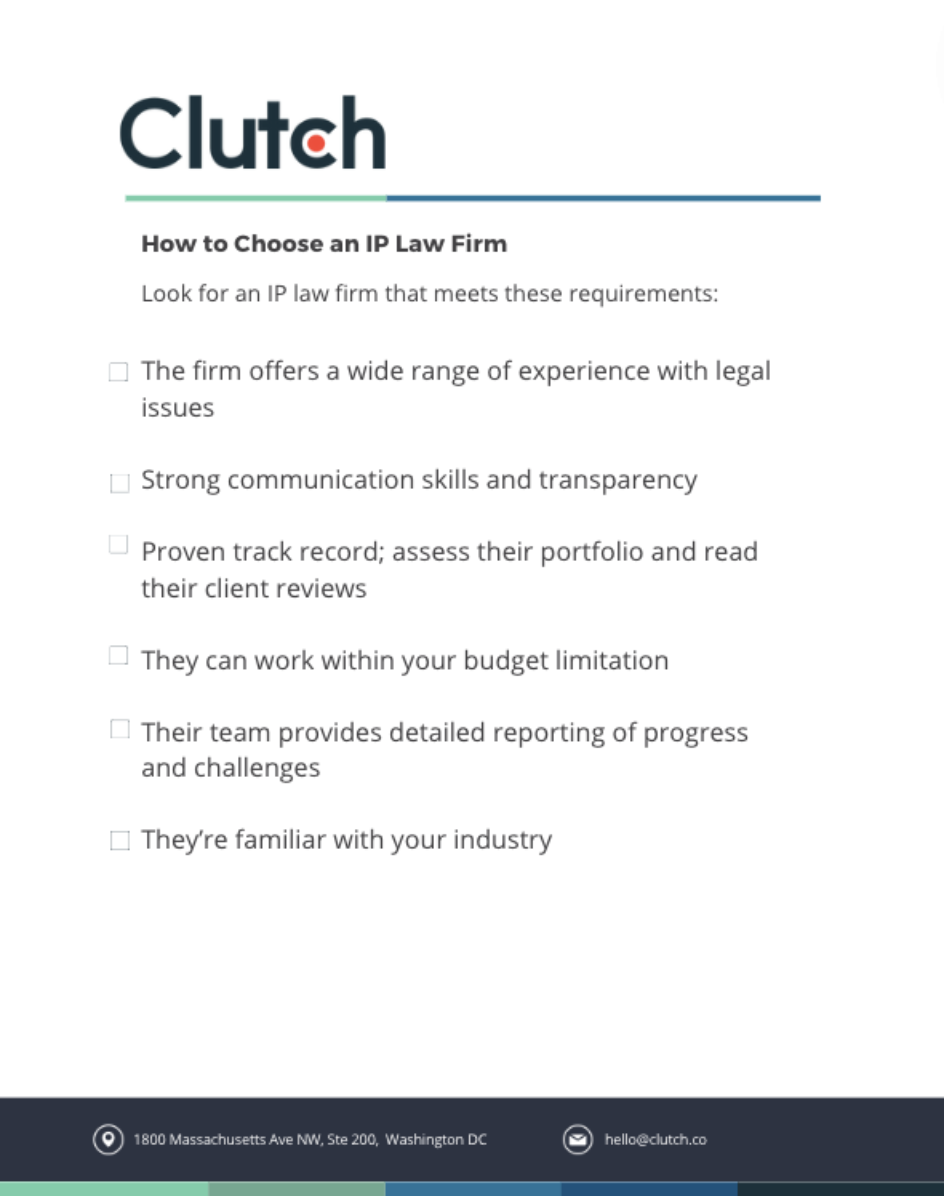

Updated December 9, 2025
Intellectual property (IP) is a valuable asset for businesses of all sizes, and protecting it is essential to maintain a competitive edge in the market. However, navigating the complex world of IP law can be challenging, especially if you are unfamiliar with the legal landscape. Learn how to choose the right IP law firm for your company’s business goals.
If you're a business owner, protecting your intellectual property is essential to maintaining your company's competitive edge in the market. Intellectual property law is a complex area, and navigating it alone can be challenging. Hiring an IP law firm can provide you with the expertise and resources you need to protect your company's assets, whether it's patents, trademarks, or copyrights.
An experienced IP law firm can also help you defend your intellectual property rights and advise you on how to leverage them effectively. By hiring an IP law firm, you can focus on growing your business while leaving the legal complexities to the experts.
Looking for a Legal agency?
Compare our list of top Legal companies near you
But with so many firms to choose from, how do you know which one is right for your business? In this article, we'll provide you with a comprehensive checklist that outlines the key factors to consider when hiring an IP law firm. Whether you're looking for assistance with filing a patent, defending your trademarks, or drafting license agreements, our guide will help you select the IP law firm that best suits your specific needs.
Setting goals when choosing an IP law firm ensures alignment. It helps you find a firm that can meet your specific needs and achieve your desired outcomes in intellectual property matters.
By communicating your specific needs and objectives, you can find an IP firm that understands your vision and can provide the appropriate legal support.
Different businesses have different needs when it comes to intellectual property. Your business could be looking for assistance with patent protection, trademark registration, trade secrets, licensing agreements, or other IP legal matters.
Setting your goals before searching can help you find a set of IP attorneys who can develop a customized strategy for your needs. A lot of IP law firms have staff that are dedicated to different services like patent lawyers, trademark attorneys, and of course, like traditional law firms, paralegals that will assist with any additional tasks.
Having specific goals also enables businesses to discuss budget and cost considerations upfront with IP law firms.
Creating a budget allows you to allocate your financial resources effectively. It helps you determine how much you can afford to spend on legal services and ensures that you stay within your financial limits.
A budget helps with prioritization, transparency, and accountability when it comes to working with intellectual property lawyers.
When a budget is in place before hiring, your team will have more negotiating power when it is time to sit down with law firms.
Having a budget ensures that your team will make informed decisions about how to allocate your resources when selecting a law firm that will protect your business’s IP rights and provide supreme legal advice.
After understanding your needs for IP protection, your research process can begin.
Do the following when researching potential IP law firms:
Once your team has put a list together, start looking on their company websites to view their practice areas, customer testimonials, IP lawyers on their team, and more.
Additional Reading: ‘IP Law Glossary: 82 Essential Terms’
A shortlist streamlines the decision-making process by narrowing down your list of options to a select few.
Once this is done, your team can focus on evaluating the most promising IP law firms. You can look at each individual IP law firm more closely, getting a more targeted view of their expertise, responsiveness, and overall compatibility.
Shortlists also provide flexibility in the case that any of your initial choices fall through or do not meet your expectations.
By carefully selecting a shortlist of potential firms, you can optimize your efforts in finding the most suitable IP law firm to meet your specific needs.
Start interviewing IP law firms to ask relevant and important questions that will help your business gather information.
Here are some potential questions to ask:
Remember that these questions should act as a guide. Make sure you are asking questions to providers that will give your business valuable insights into making an informed decision about the IP law firm that will best fit your requirements.
When you’ve come to a decision, the last step is to hire and onboard your chosen IP law firm. Schedule a meeting with the team to ensure that there will be a smooth transition, and that will set up an effective working relationship.
Define any expectations, share all of the necessary information, establish a communication schedule & channels, and review any payment or billing terms.
Foster a culture of collaboration between your company and the IP law firm. Each law firm will have unique requirements, so it’s essential to consider those to have a thriving working relationship.
Searching for the right intellectual property law firm? Use this checklist to begin leveling up your law services.

Download our IP law firm checklist to assist your company’s search.
Choosing the right IP law firm for your business is a critical decision that can have a significant impact on your organization's future success. It is essential to take the necessary time and effort to make an informed choice that meets your specific needs.
By considering factors such as experience, expertise, communication, and alignment with your values and goals, you can select a partner who will help you protect your intellectual property and achieve your business objectives. With the right IP law firm at your side, you can feel confident that your intellectual property is in good hands and focus on growing your business.
Use our checklist to find the perfect match for an intellectual property attorney to protect your business.
Check out Clutch’s list of IP law firms to find the right support for your company’s business.


